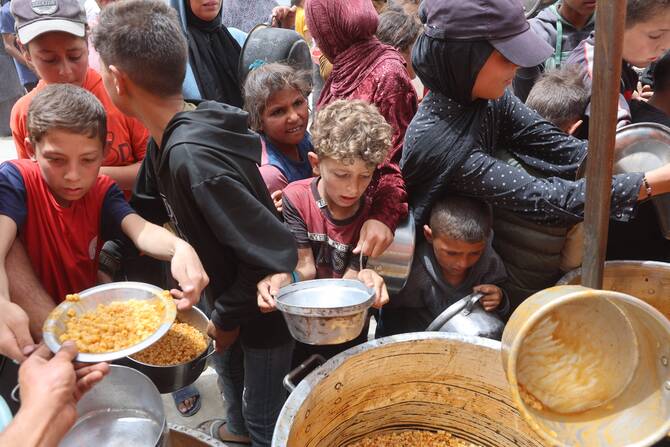LONDON: Lawyers representing the UK government have told the UN’s top court that Israel must allow aid supplies back into Gaza.
Speaking at the International Court of Justice in The Hague, Sally Langrish, legal advisor to the UK’s Foreign Office, said Israel must also give the International Committee of the Red Cross access to Palestinian prisoners and insisted that the UN’s agency for Palestinian refugees was impartial.
Her comments on Thursday were made on the fourth day of hearings at the ICJ, which was asked last year by the UN General Assembly to give an advisory opinion on Israel’s legal obligations on the operations of UN agencies and international organizations in the occupied Palestinian territories.
The hearings, which finish on Friday, have centered around Israel’s cutting off of aid supplies to Gaza and come amid dire warnings about the collapse of emergency food and water supplies to Palestinians.
“Israel must facilitate full, rapid, safe and unhindered humanitarian provision to the population of Gaza, including food, water and electricity, and must ensure access to medical care in accordance with international humanitarian law,” Langrish told the court.
David Lammy, the UK’s foreign secretary, this week said Israel’s decision to block aid deliveries to Gaza was a “horrendous” decision that was causing dire suffering.
On Friday, the Red Cross warned that aid operations in Gaza were on the “verge of total collapse,” describing scenes of starving children and fights over water.
The stating of the UK’s legal position at the ICJ also came as the British government confirmed it was in talks with France and Saudi Arabia over officially recognizing the Palestinian state.
Spain, Norway and Ireland recently added themselves to the 160 countries that already recognize Palestine.
The UK was among the 137 countries to vote in favor of the UN General Assembly resolution in December to request the ICJ opinion. The US and 10 other nations voted against and 22 abstained.
The resolution was in response to Israel passing a law that effectively banned the main UN organization delivering aid to Palestinians, UNRWA, from operating in Gaza and the West Bank.
Israel claims that workers at the agency took part in the Hamas attack on Israel in October 2023 that sparked Israel’s devastating military campaign in Gaza.
Langrish said the allegations of any UNRWA staff involvement in the “barbaric” Hamas attack must be thoroughly investigated. But she said the UK “supports UNRWA’s continued work and commitment to the principle of neutrality.”
She also highlighted Israel’s obligations under international law to allowing the Red Cross access to Palestinian prisoners.
Langrish said there had been “credible reports of ill-treatment of Palestinian detainees held in Israeli custody” since the war started and that Red Cross access was aimed at ensuring they are treated humanely.
That Hamas had also not allowed Red Cross access to the hostages held in Gaza was also “completely unacceptable,” she said, but added that this could not be used to justify Israel denying Red Cross access to Palestinian detainees since.
The ICJ’s opinion is expected to take months to be delivered.
At least 29 people were killed in Gaza on Friday, AFP reported, with the number of Palestinians killed in the conflict now more than 52,000. The Hamas attack in October 2023 killed 1,218 people.


























